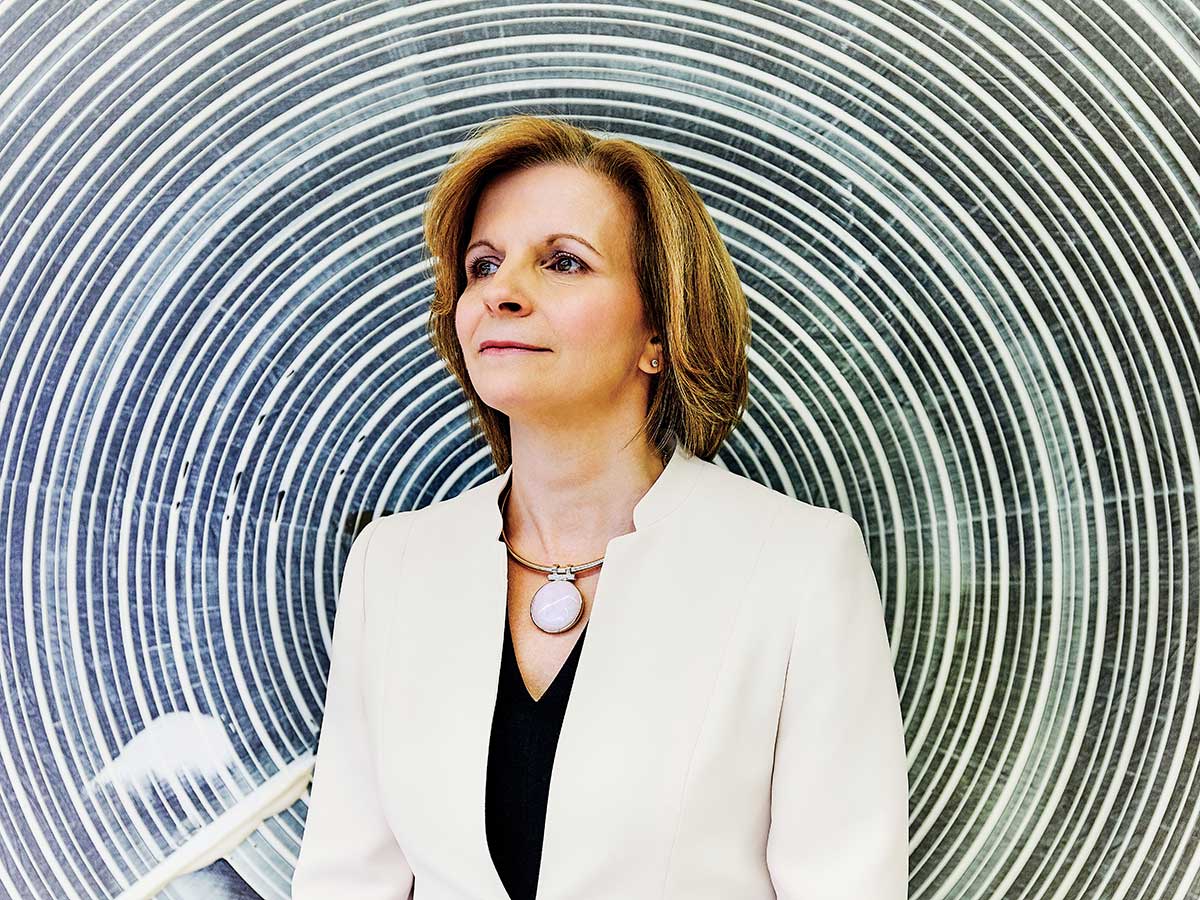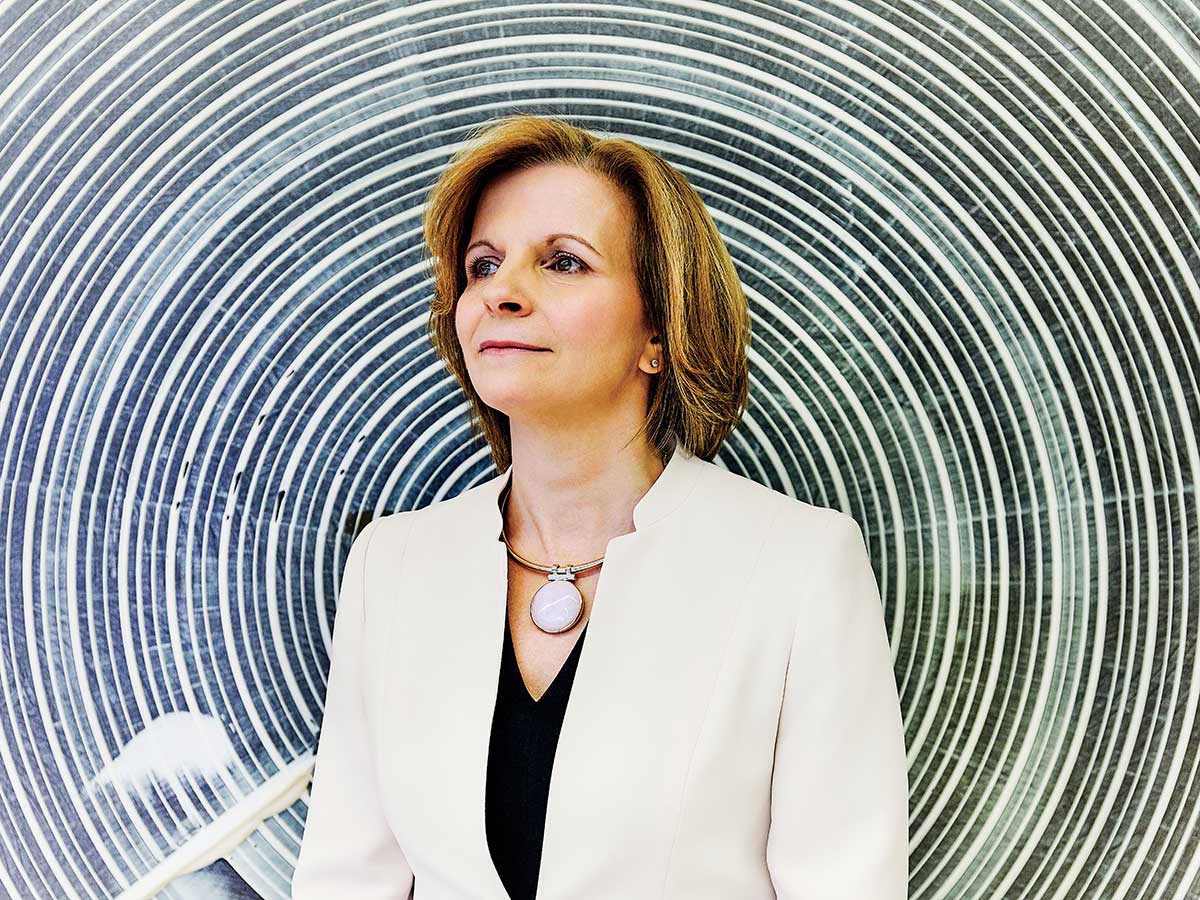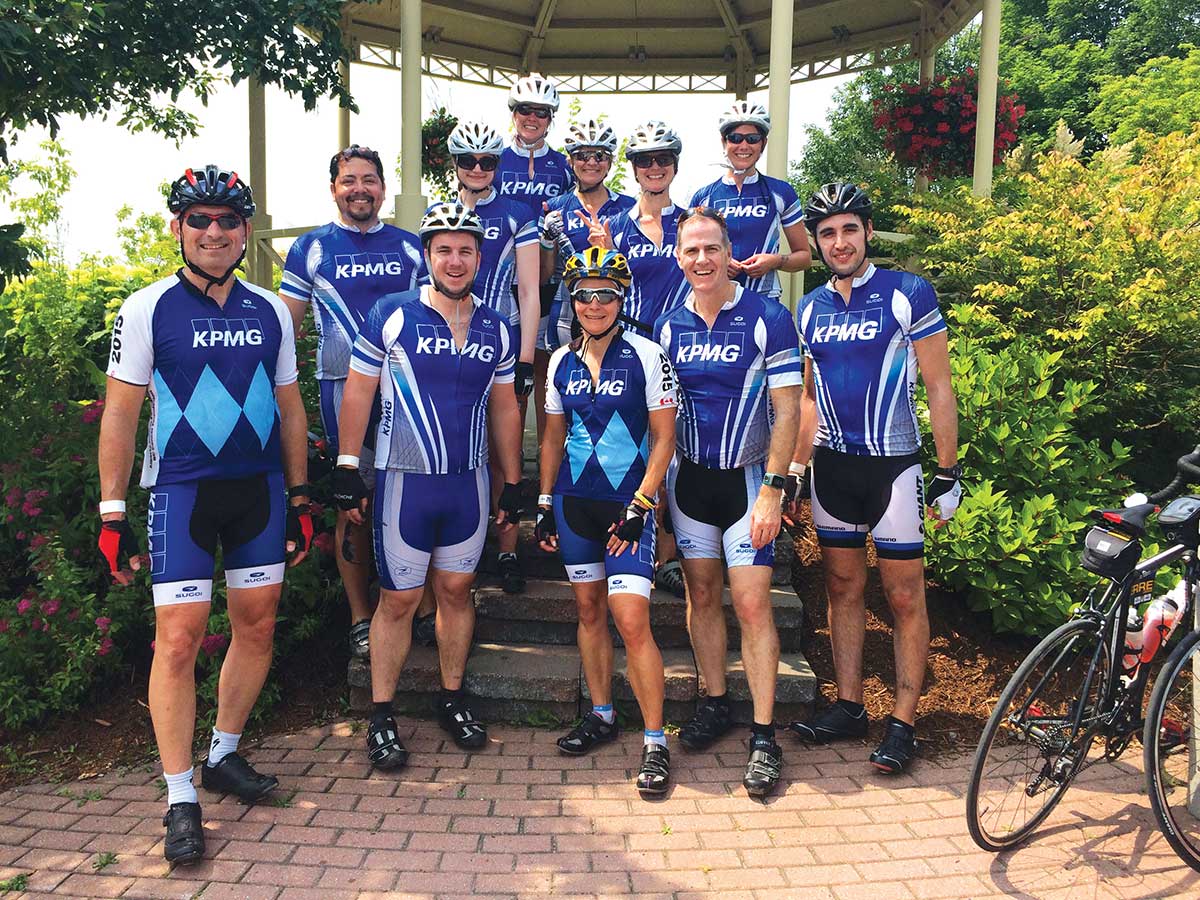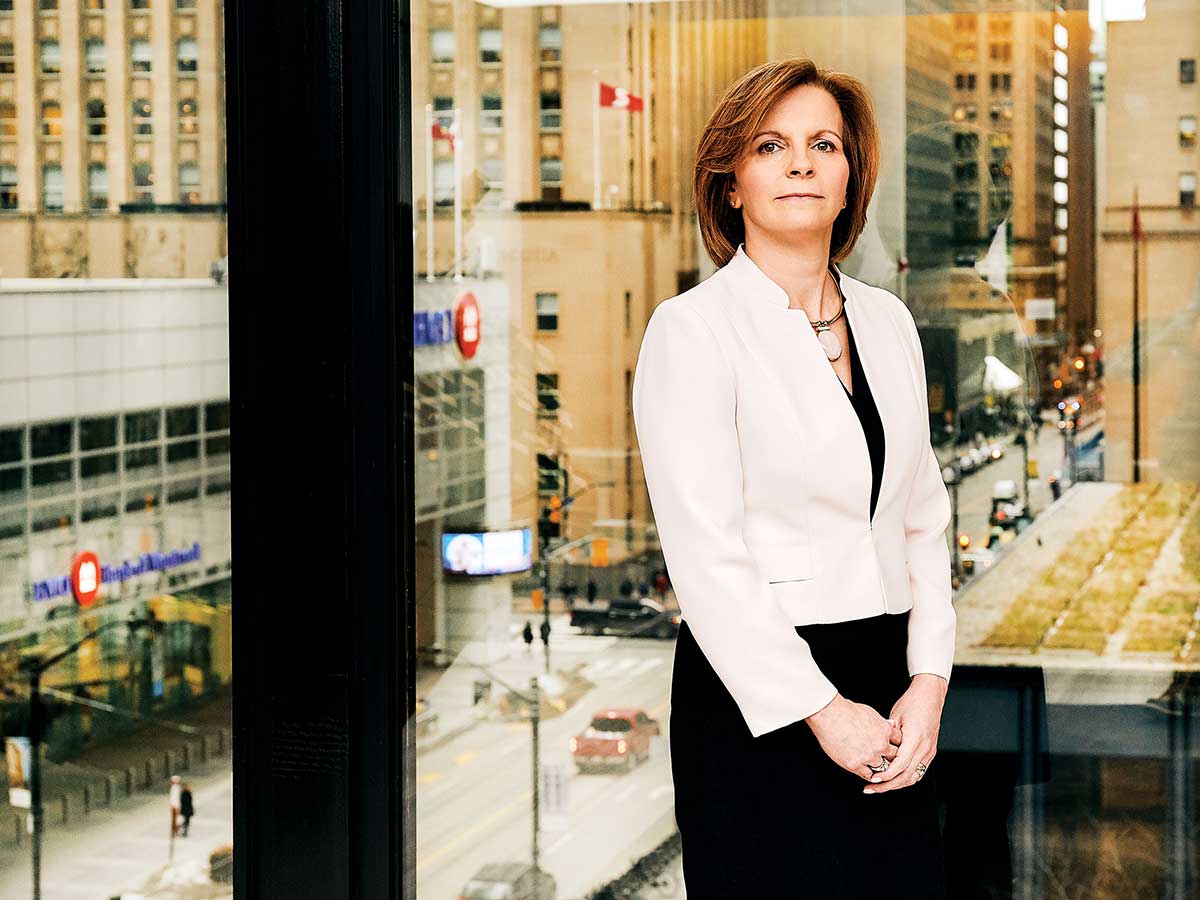
Hello from the other side
 Beth Wilson (Photograph by Luis Mora)
Beth Wilson (Photograph by Luis Mora)
Beth Wilson’s dream job slipped away on a sunny summer morning in 2016. She was seated at her desk inside KPMG’s downtown Toronto offices when the phone rang, delivering bad news: she would not be the firm’s next CEO.
Wilson was shattered. She’d spent months gunning for the top position, plus more than a quarter-century climbing the ranks of the company—she’d never worked anywhere else. At home that night, she cried in her 18-year-old son’s arms, wondering what would come next. She didn’t want to be known as the woman who almost became the first female CEO of a Big Four firm. If there was no room for her to grow at KPMG Canada, she eventually decided, she had to move on. “There was something bigger for me to lead.”
At first, Wilson thought “something bigger” might be a bank, charity or corporation. “I didn’t even think about a law firm, to be honest,” she says. But when she learned that Dentons was seeking a new Canadian CEO, she reviewed the job description. She ticked every box; it even stipulated that legal experience wasn’t necessary. “I felt like I could have scratched out the title and written my name across the top of the page,” she says. “Everything matched up.”
Dentons thought so, too. The firm picked Wilson, 50, as its new leader in July 2017—an unprecedented move. No major Canadian law firm had ever hired a non-lawyer CEO. “An accountant running a law firm is not the norm,” says Wilson’s longtime colleague Mary Lou Maher, an FCPA and KPMG’s Canadian managing partner of quality and risk management. “She knew it was going to be a challenge. But I’ve never seen Beth back away from a challenge.”
“An accountant running a law firm is not the norm. But I’ve never seen Beth back away from a challenge.”
Dentons isn’t just any law firm, either. It was founded in 2013, through the merger of three major multinational firms, and it has swallowed up other firms with dizzying speed ever since. With 10,000 lawyers and 175 offices across the globe, it’s now the world’s largest firm—and it’s not finished. “There is no logical end,” Dentons’ global CEO Elliott Portnoy told the Wall Street Journal in 2015. “We’re going to be driven by our strategy.” It’s not expanding just to compete with other law firms; it wants to take on the Big Four.
“Globally, they are some of our largest competitors,” says Rick Scott, who works closely with Wilson as chair of the Dentons Canada board. “The Big Four are moving more and more into the legal space.” Like Dentons, they’re scooping up legal partnerships on every continent and adding various kinds of law—tax, of course, but also immigration, mergers and acquisitions, and many more—to the broad list of services they offer. The legal arms of the Big Four now employ nearly 9,000 lawyers and operate in more countries than the 10 largest law firms combined. According to Thomson Reuters research, about 22 per cent of law firms reported losing business to the Big Four in 2018—a significant figure, given the global legal market is about $600 billion (U.S.).
In the eyes of law firms, Deloitte, EY, KPMG and PwC are beginning to look like the Four Horsemen of the Legal Apocalypse. They’re bigger, richer, nimbler with technology and equipped with a fresh arsenal of legal services. For clients, the appeal is obvious: why spend time and money hiring a separate legal firm when you can get everything you need from one global organization that you probably already work with? “Imagine being able to go to a client and offer a one-stop shop,” says Wilson. “We shouldn’t fool ourselves or understate the competitive force of the Big Four, because it’s not just about competing to provide legal services anymore.”
Dentons, however, is uniquely positioned to stave off the competition. The firm offers many of the same advantages as the Big Four: a reputable brand, a global network and an increasingly holistic suite of services. And in Wilson, it’s found a secret weapon: an FCPA and 26-year KPMG veteran who understands how the competitors think. “This is our opportunity to learn something from the accounting firms,” says Scott. And it might just be Dentons’ opportunity to beat them.
 Wilson (centre) and her husband, Brent (far left), at the 2015 Ride to Conquer Cancer (Photograph courtesy of Beth Wilson)
Wilson (centre) and her husband, Brent (far left), at the 2015 Ride to Conquer Cancer (Photograph courtesy of Beth Wilson)
To defeat the Big Four, Beth Wilson first needed to conquer her new phone. On her first day as Dentons CEO, the small things humbled her most: a foreign phone system, a new executive assistant, an uncooperative office printer. After a lifetime at KPMG, everything felt unfamiliar. “I was starting from scratch,” she says. “I wasn’t expecting that.” When she got home that day, she told her husband, “I feel like the most ineffective executive ever.”
The trivial annoyances exacerbated a deeper anxiety: would Dentons’ partners and associates truly accept her, or treat her as an outsider? “It was highly unusual for them to go outside the partnership to find a CEO,” she says. “Never mind outside the firm, and never mind outside the profession.”
Wilson (née Thornton) never pictured herself working in law, or even in accounting for that matter. Attending high school in Ajax, Ont., in the mid-1980s, she dreamed of becoming a dentist—that is, until she shadowed one for a day. “After that,” she says with a laugh, “I didn’t want to be a dentist.”
Wilson’s guidance counsellor suggested accounting as a backup career. He saw the makings of a business leader: Wilson was a great public speaker, she served on student council and she had a knack for numbers. On his advice, Wilson enrolled in commerce at the University of Toronto.
In the summer after her third year, Wilson worked in KPMG’s Scarborough office. “I loved the atmosphere. I loved the work,” she says. When she graduated the following year, she accepted a full-time position at the firm’s Richmond Hill office. “I didn’t even bother interviewing with another firm.”
Around the same time, she married Brent Wilson, a technical specialist at Canon, and began studying for the UFE (now known as the CFE). She hung a “Go for Gold” banner above the desk in her cramped condo, where she spent long evenings writing mock exams and poring over a dictionary-thick study binder. The test didn’t go as planned. “I came home from the first day of writing thinking I’d blown it completely,” she says.
Wilson performed better the next few days, but she was still surprised when she learned she’d made the honour roll. On the day of the awards ceremony, Brent drove her downtown. They were scheduled to grab the keys to their new house in Ajax that same afternoon, so he waited in the lobby. “I thought I was going upstairs to shake some hands,” Wilson recalls. Instead, there was an elaborate luncheon waiting—and more good news: Beth had won the gold medal, meaning she had placed first in the country. Shocked and delighted, she sheepishly whispered to an organizer, “Do you think I could bring my husband up and let him know what’s going on?”
The true reward was that Wilson’s gold-medal effort caught the attention of KPMG brass downtown. “Small suburban girl makes it big on the radar screen,” as she puts it. “All of a sudden, people were like, ‘Who is this Beth Wilson person up in Richmond Hill?’ ”
 Wilson at the Dentons Canada office in Toronto’s Financial District (Photograph by Luis Mora)
Wilson at the Dentons Canada office in Toronto’s Financial District (Photograph by Luis Mora)
The higher-ups invited Wilson to join the downtown Toronto office for a two-year stint in the department of professional practice. The department was accountancy’s equivalent of a SWAT team, assigned to the firm’s toughest files, such as interpreting new accounting standards for income taxes. She worked alongside partners decades her senior. Some of them intimidated her at first but soon became patient mentors. “Those two years were pretty amazing,” she says. “They opened my eyes beyond the small, suburban, owner-managed clients that I had been working with.”
By 2000, after nine years at KPMG, Beth became an audit partner, specializing in electronics, software and communications companies. “She made partner quicker than the average bear, which is no surprise,” says Maher. “She seems to get a lot more out of an eight-hour day than the rest of us. She always made time for people that needed input, counselling or mentoring.”
Wilson’s reputation prompted KPMG Canada’s then-CEO, Bill MacKinnon, to name Wilson head of human resources. A year into the role, he sat down with her and said, “You’re doing a really good job. But I didn’t put you in the role to do a good job. What’s your legacy going to be?”
Wilson’s legacy at KPMG spans several roles. She led HR for more than 5,000 employees and later took charge of KPMG’s regional offices (“everything but the big stuff,” she jokes). She then graduated to running the Toronto office, where, working with Maher, she developed and led a five-year plan to grow their audit practice. The long-term approach emphasized multi-functional teams of audit, tax and advisory experts, working together to win new clients and protect existing clients from approaches from other firms.
In most meetings, according to colleagues, Wilson would be the smartest person in the room. She might also have been the only woman; after Maher, she was the second woman on the firm’s management committee. “Experiences like that shape your view of inclusivity,” she says. “I’ve witnessed how things change around a table when you have people with diverse backgrounds.”
To start, Wilson believed KPMG could do more for mothers. Brent stayed home to care for their two boys, both of whom are now university age, while she continued to work. The arrangement wasn’t unusual to Wilson: her father, a teacher, had done the same for her, while her mother, also an educator, stayed on the job. Unprompted, Wilson decided to create a maternity guide for KPMG, a resource that pregnant women and new mothers could consult to learn what their career options were and what questions they should ask to whom. “I have an eye for gaps that get in the way of inclusivity,” she says.
“I began to see in myself what others had told me they saw: CEO potential”
Maher can attest to that. When she came out as a gay woman, Maher invited her colleagues to participate in a poster campaign for allies. “Beth was one of the first people to sign up to get on a poster,” says Maher.
In her last seven years at KPMG, Wilson oversaw community leadership at the firm. Then-CEO Bill Thomas chose her for the role because he trusted she’d transform the supposedly “soft” file into a core pillar of the business. Under her leadership, KPMG Canada integrated community involvement—charitable work, volunteering and other grassroots efforts—into performance evaluations and partner promotion criteria. “Imagine the impact of 5,000 people across the country engaging in their communities around a cause they are passionate about,” says Wilson.
Wilson was a natural fit for the role, given her own community involvement. She volunteered with the profession, focusing on exams and education. She sat on the Toronto Region Board of Trade and advised organizations such as the Ontario Science Centre. She worked with charities like the Ride to Conquer Cancer (she’s done it nine times and was the ride’s first female chair) and United Way (she is its 2019 Greater Toronto campaign chair). Together, those efforts earned her a slew of awards recognizing her as one of Canada’s most powerful women. In a recent book, The Collective Wisdom of High-Performing Women, Wilson wrote, “During those years, as I learned and grew as a leader, I began to see in myself what other colleagues, and my CEO, had told me they saw: CEO potential.”
So, in 2016, when KPMG began looking for a new CEO, Wilson put her name in the hat. She was scrutinized ruthlessly: for her business decisions, for her leadership style, for the way she dressed. The hiring committee called her too soft, too directive and too ambitious all at once. Some doubted her authenticity, taking issue with her unfailing poise. “People spent time debating whether I was too polished or perfect or not speaking from the heart,” she wrote. “I wondered if anyone had ever told a man he was too good at public speaking. What I experienced reminds me of similar criticisms of Hillary Clinton during that time period.”
Wilson collided with the glass ceiling at full speed, but it didn’t break. “I don’t think the fact that I wasn’t chosen was explicitly about being a woman, although I do believe that organizations still struggle with the different style of female leadership,” she wrote in the book. On her last day at KPMG, she sent an email to some of her female colleagues. “I am convinced that KPMG has a future female CEO in its midst today,” she wrote. “I am leaving KPMG not because I failed to become CEO. I am leaving KPMG because I want to continue to grow as a leader, because my work is not done.”
At Dentons, Wilson’s work was just beginning. In her first days, she sent out a company-wide survey and embarked on a “look, listen, learn tour,” as she called it, meeting with partners, associates and clients to discover what worked, what didn’t and what needed to change.
Globally, Dentons is in a period of rapid expansion. Its 2015 merger with the massive Chinese firm Dacheng made it a legal superpower, and it has since focused on expansion in emerging markets in Africa and Latin America. In firm parlance, it’s “inventing the playbook” on how to be the world’s largest law firm, placing an emphasis on technology and reinvention, as well as growth. In Canada, it’s Wilson’s role to translate those vague ideals into concrete action. “How you take a strategy and execute it—that’s the business and process training from my CPA training, for sure,” she says.
Wilson began by delving into Dentons’ finances. She strengthened internal management reporting and communications, and created a five-year strategic plan. By the end of her first full year as CEO, Dentons had already exceeded its annual financial targets.
“We want to disrupt ourselves. Lots of businesses don’t want to do that. It’s scary.”
Wilson also dipped into her well of HR experience to place an emphasis on Dentons’ staff. Scott says she frequently challenges associates, giving them opportunities to prove their mettle, as she had as a young KPMG associate. Now that most of Dentons’ associates are millennials, a notoriously itinerant generation, focusing on talent is more important than ever, Scott adds. “We’re a professional services organization,” he says. “Our talent walks out the door every night and we expect it to come back the next morning.”
To keep her people coming back, Wilson appointed Dentons Canada’s first chief talent officer, Jillian Frank, a partner in the firm’s employment and labour practice in Vancouver. During Wilson’s tour, associates told her they didn’t grasp the pathway to partnership, or if they were even interested in it. So, among other things, Frank created an associate “playbook” (it’s a popular word in the Dentons vocabulary) that outlined their possible career paths, not unlike the maternity guide Wilson once devised. It’s structured like a honeycomb rather than a ladder, to show associates that there’s more than one way to move up. If the playbook succeeds in Canada, Dentons may roll it out in other countries, too.
Wilson also caters particularly to female employees with events hosted by SheEO, an organization that fosters female leadership and funds women-led ventures. Thirty per cent of Dentons Canada’s partners are women (compared to an industry average of 19 per cent, according to McKinsey), and 45 per cent of the board is female (versus an average of 25 per cent among the FP500, according to the Canadian Board Diversity Council). “It’s awesome,” says Wilson. “But it’s not where it needs to be yet.”
Innovation is another plank of Wilson’s leadership. Under her watch, Dentons became the first Canadian firm to join the Global Legal Blockchain Consortium, a group advocating for consensus-based blockchain infrastructure and regulation in the legal industry. In February 2018, Dentons lawyers in Toronto and Singapore collaborated in the Global Legal Hackathon, a 51-hour sprint to combine law and technology. Dentons has also incubated and partnered with artificial intelligence companies, such as Ross Intelligence, a firm founded in Toronto that uses machine learning to sort through thousands of precedents and spit out relevant material in seconds.
Wilson insists Dentons will not hand down technologies from on high, though. “That’s how things have been done in the past. ‘Here’s a shiny new tool. Start using it with your clients tomorrow.’ ” Instead, she plans to let her lawyers and their clients drive demand. “If someone says, ‘I wish there was a piece of technology that could help with this,’ we’ll go source a couple and run some pilot programs.”
Increasingly, Dentons isn’t just hiring lawyers, just as the Big Four aren’t hiring only accountants and auditors. “We’ll see technology experts and coders working side by side with lawyers,” says Wilson. “We have lawyers joining us today who know how to code. They can ask a client 10 questions and use a program to populate a first cut of a document based on their answers.” As tedious and low-value legal work gets automated, she adds, lawyers can offer clients more. “Let’s expand the boundary of what we think of as legal services.”
Wilson isn’t interested in playing defence, or merely safeguarding Dentons’ legal turf. She wants a slice of the Big Four’s business. In April, her firm launched Dentons Data, a first-of-its-kind suite of services meant to help clients harness the power of Big Data while prioritizing privacy and regulatory compliance—the type of thing a client might expect the Big Four to provide. Wilson also hired a CPA and 13-year PwC veteran, Andrea Nicholls, as Dentons Canada’s CFO in March. (Like Dentons, the law firm Bennett Jones recently made a big bet on an FCPA, hiring former PwC vice-chair Gino Scapillati as its own vice-chair of strategy and innovation.)
Wilson doesn’t spend much time worrying about whether she, an accountant, belongs at Dentons anymore. She takes solace in the fact that the firm saw danger on the horizon and acted—even if it meant handing the reins to someone who spent 26 years in enemy territory. “Dentons has a high sense of self-awareness about the need to disrupt yourself in order to change. Lots of businesses don’t want to do that. It’s a scary thing to do,” she says. “It shows a great sense of confidence that they could, God forbid, bring an accountant in and not have the world come crashing down.”